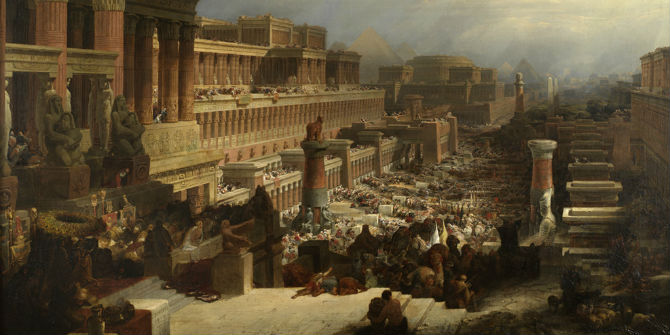 What drives illiberalism, asks Daniel Daianu (SNSPA, Romania)? He writes that while the liberal order of the world is being severely tested, liberal ideals still have the upper hand in the industrialized world and many people stand behind it. Furthermore, he argues that for democracy to survive, its liberal core must be preserved.
What drives illiberalism, asks Daniel Daianu (SNSPA, Romania)? He writes that while the liberal order of the world is being severely tested, liberal ideals still have the upper hand in the industrialized world and many people stand behind it. Furthermore, he argues that for democracy to survive, its liberal core must be preserved.
The distinction made between ‘liberal’ and ‘illiberal’ democracy is both conceptually and operationally meaningful, but can still sow seeds of confusion. This is because democracy has liberalism in its genes; liberalism in a deep sense embodies spiritual and civic commitment to a host of de facto and de jure values. These values and the related political regime mean, basically, power in the hands of citizens and decision-making made via institutionalised checks and balances – what John Kenneth Galbraith and others referred to as countervailing power, which prevents absolute power from being ceaselessly accumulated. Democracy implies an effective separation of powers; it also implies respect towards fellow citizens, tolerance, and ethical conduct in social and political life. Within this interpretation of democracy, liberalism is a fundamental, organic foundation of democratic parties’ Weltanschauung; this foundation is present from the right to the left of the democratic spectrum, in the philosophy and conduct of political parties. In democratic Europe, for instance, Christian democracy and social democracy belong to an enlarged political ‘family’ that relies on deep liberalism at its core.
The extent to which liberalism in Europe overlaps with what one meets in the US, is subject to debate. For there are significant differences in terms of the relationship between the public and the private spheres, the size and content of state intervention in the economy, regulatory systems, etc. Admittedly, conservative political philosophy contains a liberal component when it assimilates the rules of political competition and a democratic political regime.
But there is evidence of mounting illiberal temptations in the industrialized world, in democratic societies. Are these temptations linked with temporary phenomena, in the ‘extraordinary times’ we are living through, or do they have deeper roots? An answer to this question begs an examination of trends in society and economy, of the emergence of new (unconventional) threats, and, not least, of failed public policies.
The argument that ‘liberal democracy’ is on the wane is wrong to the extent policies can be corrected, citizens and elites alike do not lose trust in democratic values. It may also be true that, although democracy has a ‘liberal core’, it can also be driven by ‘illiberal’ components, and that the magnitude of the latter can vary. But for democracy to survive, its liberal core must be preserved.
Markets, liberalism, and democracy – where limits show up
Free markets[1] are the driving force behind entrepreneurship and a vibrant economy. The thinking of Adam Smith, John Stuart Mill and, later, the ‘Austrian School’ were validated by history in this regard. Development is inextricably linked with free markets, and the progress of less advanced economies provides many lessons in this respect. The collapse of communism was brought about, primarily, by innate flaws in the command system, as Ludwig von Mises and Friedrich August von Hayek had, among others, had anticipated. Over the past few decades, China’s economic miracle is perhaps the most convincing proof of the extraordinary energy that economic freedom provides in unleashing entrepreneurship, in pushing an economy ahead with the government (state) still the key player in steering the economy and allocating resources, and in building competitive advantage (via industrial policies). The ‘return to Europe’ of former communist countries in central and eastern Europe involved radical institutional transformation and entailed economic progress – some less spectacular aspects of the transition notwithstanding. That there is a resurrection of national economic interests in this region of the European Union is an evolution that deserves an analysis on its own; part of it is linked to fear of the ‘middle income trap’.
But markets do not bring the best results automatically. Market failures require government intervention. This has brought about, over time, the development of public sectors, the setting up of public and private institutions that insure against risks (pension systems, health-care systems, etc.), and mechanisms for the regulation and supervision of financial markets, including antitrust law (against collusion/oligopolistic agreements, rent-seeking).
The very functioning of the democratic state has required public policies meant to ensure basic public goods, among which defence and security, education and health (areas that should not be left in the care of the private sector alone), a judicial system based on the rule of law (‘no one is above the law’), etc. History shows that where social cohesion is badly damaged, negative consequences arise and ‘social capital’ and ‘social cement’ get diluted, whereby cracks emerge in the democratic process that may give rise to social and political conflict.
Social fragmentation and growing perceptions of individual and collective insecurity can augment political demands for protection via government intervention. The backlash against globalization, a spreading propensity to turn inwards and the rise of protectionism[2] are associated with the fallout from a simplistic vision of globalisation, one which disregards (and underestimates) the number of losers from global competition. Globalization, as an embodiment of liberalization/economic openness, unless it is wisely and pragmatically managed, leads to fierce counter-reactions.
It is often said that people do not grasp the benefits of globalization. The problem with this assertion is that while benefits may frequently prevail over costs at the aggregate level, at local/community level costs may be massive, and social dislocations hard to bear.[3] And where communities are rife with losers, their interests can easily be articulated in a quest for protection. Brexit, and the last presidential election in the US (the impact of fake news and media manipulation notwithstanding), epitomize an undeniable reality, one which can be seen in other EU member states as well.
It is no wonder that international institutions pay increasing attention to the effects of globalization, and a thinning of the social fabric and social fragmentation that can end in full-blown political disarray. Major central banks (the Federal Reserve, the Bank of England, the ECB, etc.) devote increasing attention to income distribution, a research topic one could hardly have imagined them focusing on not so long ago.
Things get more complicated in countries where political leaders justify public policies that entail high social costs by repeating constantly that ‘there is no other way’, or ‘that this is what international markets demand’. This type of argument is likely, in the end, to damage the institutional and political legitimacy of policymakers; and it can fuel social and economic pressure (on the part of local business groups) in favour of protectionism. A reinterpretation of globalisation is, therefore, needed; one that takes into account the relationship between the wide diversity of citizens’ social and economic circumstances. In other words, a narrowly-understood economic liberalism, i.e. market fundamentalism, can pave the way for the erosion of the social foundation of democracy, i.e. the erosion of the middle class. Under such conditions, political extremism and exacerbated populism emerge. Market fundamentalism works against liberalism, against democracy, in its deepest meaning. Just as one can talk about ‘illiberal democracy’, one can identify ‘undemocratic liberalism’(Yascha Mounk).[4]

More on what fuels illiberal propensities nowadays
Economic insecurity and its ‘illiberal’ fallouts can be related to a dramatic change in the balance of power in the global economy, especially towards the new economic powerhouses (China in particular, but also India, etc.). Robert Kaplan alludes to this with a metaphor: ‘The Return of the Marco Polo World’.[5] Trade disputes can mushroom in such an environment. Social fragmentation and anxiety, which mirror economic insecurity, can be fostered by new technologies (e.g. ‘big data’, the power of some companies – the Facebook scandal is a harbinger in this regard) and strengthen the case for government intervention, not only via regulatory steps. New technologies can even enhance the resort to illiberal methods in societal management.
Fear of the unknown (of all sorts), of insecurity in general, has to be factored in. People need to feel comfortable in a habitat where they have lived for a long time, and this sentiment cannot be divorced from habits and customs, from a sense of belonging to communities that share identities. But things can turn highly complex (even ugly) when authoritarianism is associated with identity, ethnic, religious aspects. Here, the democratic process may easily go astray.
There is also a disconnect between economic developments and social and political dynamics, which are defined by fury at, and protests against the elites, especially the political establishment. When people are looking for responses to overall insecurity, a sort of demonstration effect in both economic and politic regimes can be at work. There are still world political/institutional structures which feature a single ruling party. These are not necessarily closed systems. China has opened up its economy for almost four decades by introducing market-based reforms; the latter have proved remarkably successful in modernising the country. There is also a sort of a fascination with the ‘economic model’ of Singapore. And hands-on economic policies practised in emerging Asian countries have explanatory power as well. In addition, in times of economic and security strain, or when facing major ecological challenges, the appeal of an authoritarian setup may tempt some people. But it is one thing to use authoritarian means within a democratic (liberal) framework, and another to alter the democratic nature of a system (society), to give up its liberal core. Even in China, political pluralism should not be ruled out completely, although authoritarian traces will probably remain for a long time.
The European Union and the question of legitimacy and democratic accountability
The European project aimed to reconstruct economies after World War II and put aside the great rivalries between European powers – principally Germany, on the one hand, and France and the UK, on the other. It was a success story, despite the bumpy road towards building a new Europe – from six founding states in 1957 to 28 member states by 2013 (but before Brexit).
The Union’s economic gains hid for quite a while the incompleteness of its design. The financial crisis that broke out in 2008 underscored the shortcomings of its decision-making procedures and a stark fact: European institutions suffer from a ‘democratic deficit’, as many pundits and officials have put it. Financial assistance programmes for beleaguered eurozone countries (grappling with liquidity and solvency crises) have been implemented via sui generis methods and mechanisms. The latter, albeit largely understandable due to the enormous pressure of events and the need to manage acute crises, have fuelled popular discontent and increased the amount of distrust in the functioning of national and European institutions.
In light of the need to reform eurozone institutions and policies a key question arises: can financial integration overcome economic fragmentation without fiscal arrangements, i.e. risk-sharing schemes? But fiscal integration would lead implacably to the fundamental political question of the eurozone – integration, which is a fantasy under the present circumstances. Besides, there is an inner contradiction in European integration, which is epitomized by Dani Rodrik’s trilemma: integration (the ‘single market’) can hardly cohabit with autonomous economic policy and with democratic accountability at the national level;[6] something must give in in this triumvirate. This trilemma may simplify reality. However, it poses a formidable challenge to the eurozone unless integration is backed by policies and mechanisms that can iron out excessive heterogeneity and competitiveness gaps between member states – policies and tools which would prevent growing tensions that erode the social fabric and give rise to extremist reactions, populism, Euroscepticism, etc.
Disquieting prospects
Liberalism at its most fundamental identifies itself with democracy. Yet, when globalism, as a vision, leads to unrestrained liberalization by disregarding market failures and losing sight of those who lose in economic competition, democracy is jeopardised. This happens because the social fabric is worn thin, the middle class (its social basis) withers, confidence in the ruling elites fades away, and, ultimately, a crisis of democratic governance is brought about. Simultaneously, authoritarian propensities and endeavours crop up.
It may also be the case that we are going through the downward phase of a long-term, secular economic cycle; this phase can explain the ‘inward looking syndrome’ one sees in several industrialized societies, and the Great Recession (the global financial crisis) admittedly belongs to the downward phase of a secular cycle. The new industrial (technological) revolution and the emergence of new global economic powerhouses play an important part in these dynamics.
For world peace it is vital that the democratic order not be dismantled: it is vital to prevent major conflicts, trade wars, and the destruction of the multilateral system that was created in the aftermath of World War II. This does not mean that major stakeholders in the global order cannot proceed to reform the multilateral order and inter-country relationships.
In the European Union (and the eurozone) reforms are needed to increase the legitimacy of – i.e. the democratic nature of – its institutions. In order to avoid worst-case scenarios, pragmatic public policies need to reconcile the requirements of a free economy with what political and social inclusion mean in a democracy. The liberal order of the world is being severely tested but the liberal idea still has the upper hand in the industrialized world and many people stand behind it. However, if its power to shape people’s minds and conduct is to continue, an enlightened version of liberalism needs to be practised and political elites need to show more respect for their fellow citizens.
To the dismay of many, this fragility of democracy (i.e. of liberal values) is now all too apparent. This is all the more reason to learn the lessons of ancient and recent history, to be candid and honest about mistaken policies, and to be bold in trying to amend them. Democracy, with its liberal genes, is the best political regime mankind has come up with. Remembering Winston Churchill’s words is as timely as ever.
This post represents the views of the author and not those of the Brexit blog, nor the LSE. It draws on a longer essay published by Eurozine as “Is democracy doomed to lose its liberal core?” on August 3d.
Daniel Daianu is Professor of Economics at the National School of Political and Administrative Studies (SNSPA) in Bucharest and a member of the board of the National Bank of Romania. He is a former finance minister of Romania and a former MEP. He is the author of, inter alia: Emerging Europe and the Great Recession (Cambridge Scholars Publishing, 2018); Which Way goes Capitalism? (CEU Press, 2009); and What Drives the Rise of Illiberalism? (World Commerce Review, 2018).







I agree.
All that is required by normal people is.
Free countries,trading with each other and peace.